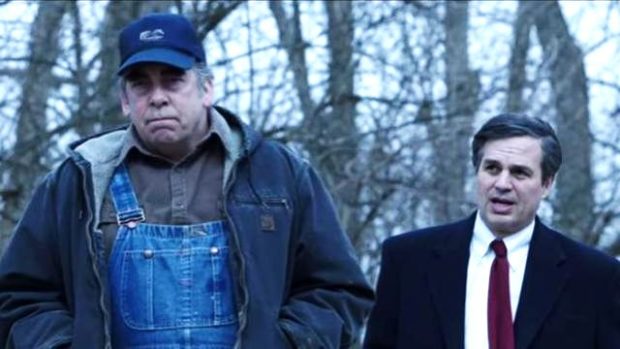
 Todd Haynes’ meticulous reconstruction of the case brought by a corporate lawyer, played by Mark Ruffalo, against the huge chemical company DuPont, is a devastating indictment of the power of big companies to avoid accountability.
Todd Haynes’ meticulous reconstruction of the case brought by a corporate lawyer, played by Mark Ruffalo, against the huge chemical company DuPont, is a devastating indictment of the power of big companies to avoid accountability.
Dark Waters tells the story of Robert Bilott, a corporate lawyer with a Cincinnati firm that specialized in defending big chemical corporations against lawsuits. In what seemed a most unlikely turn of events, Bilott became a chief attorney in a lawsuit against one of the biggest chemical companies of all: DuPont.
Bilott is played by Mark Ruffalo, who seems older, more dour, and certainly more conventional in this part than other roles I’ve seen him in. He kind of disappears into the character of this real-life attorney, which is something that the best actors know how to do. Rob Bilott is very private, self-contained, quiet and hard-working. The son of an Air Force officer, he lived in several places growing up, including Parkersburg, West Virginia, close to the Ohio border. The story begins with an unexpected visit, in 1998, to Bilott’s Cincinnati office by a farmer from Parkersburg, wanting help with the problem of contamination of his water supply from a nearby DuPont landfill. The farmer, Wilbur Tennant, played by the wonderful character actor Bill Camp, got the lawyer’s name from Bilott’s grandmother, who lives in Parkersburg. Bilott is in the middle of an important meeting, and he’s just been named a partner in the firm, so he is immediately dismissive of Tennant, saying he’ll get him a list of other possible lawyers. But the connection to his grandmother sticks in his mind, so he decides to visit her a while later in Parkersburg, and in the meantime take a look into what this farmer has to say.
What he finds is that Tennant’s cattle have been dying mysteriously, about 190 cows perishing from tumors and bloated organs. So Bilott begins, rather modestly at first, by telling his boss, who is played by Tim Robbins, that he wants to file for discovery concerning what chemicals were dumped at the landfill, including the results of a visit from the EPA. He doesn’t find anything, but the recurring mention in the documents of a chemical called PFOA, for which he can find no mention or definition anywhere, makes him suspect that the problem might have been something not regulated by the EPA. Bilott’s resulting lawsuit to get more documents results in some serious conflict with executives at DuPont, who have had a friendly relationship with the law firm, and it creates tension and controversy within the firm itself. After a few years, Bilott discovers that PFOA is a chemical, also called C8, that was used in the making of Teflon, that product for stick-free pots and pans, and that internal DuPont documents show serious health hazards, not just to farm animals, but to human beings. C8 has been dumped in the water supply, and is causing cancer and other ailments. So the case goes on, ultimately stretching across two decades.
Dark Waters is part of a genre that you might call the “crusading lawyer” story. The director is Todd Haynes, who is generally known as an experimenter, in form or subject, specializing in films that upend typical ideas of plot by introducing subversive themes. This film is far more straightforward in its style than what Haynes usually does. What it is, is a film about process. The director and his screenwriters, Matthew Michael Carnahan and Mario Correra, painstakingly reconstruct each step of the way Bilott gradually puts together a devastating case against DuPont. This includes all the setbacks and disappointments in a lawsuit of this magnitude against a powerful corporation. One of the biggest things that comes across here is that such huge companies, with their massive resources, make it incredibly difficult for ordinary citizens to fight back. And crucially, the government ends up allying itself with these companies against the people. An emotional effect you’re bound to experience watching Dark Waters is anger, because this all really happened; DuPont knew it was hurting public health, causing birth defects and cancer, and yet tried to cover it up.
Anne Hathaway is stuck with one of those thankless “suffering wife” roles as Sarah Bilott. She does the best she can. Bill Pullman shows up as a flamboyant trial lawyer helping Bilott with the case. This is really Mark Ruffalo’s film, though. His character keeps his head down and plows ahead, his obsession with the case hurting his relationship with his wife and sons, and tearing him up inside. It’s not a flashy performance, but it stays with you. Dark Waters is an education for the viewer, a crash course in corporate malfeasance, and it aims to shake you up. It succeeded with me.

